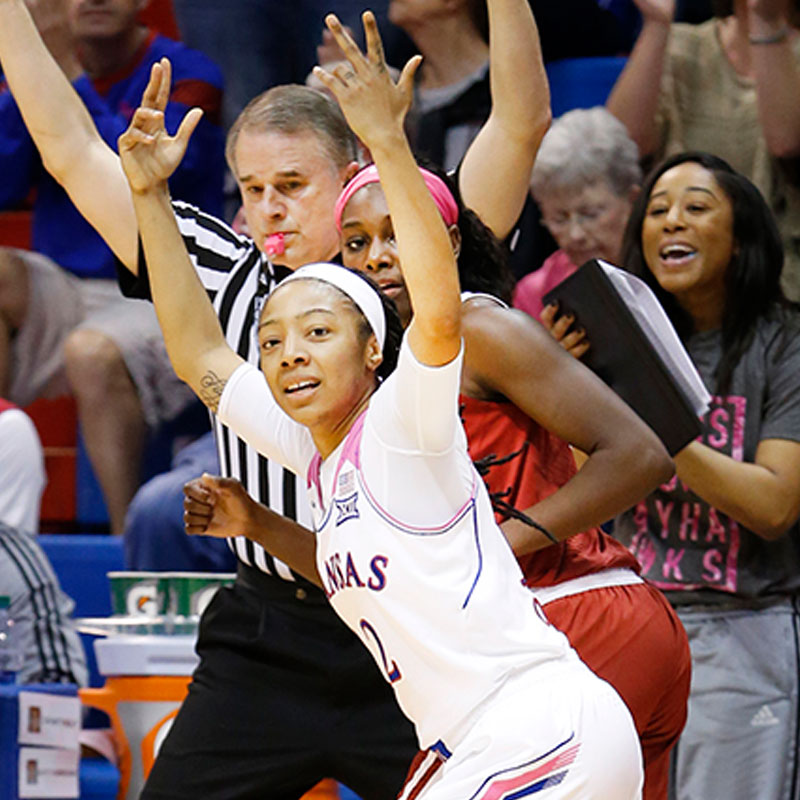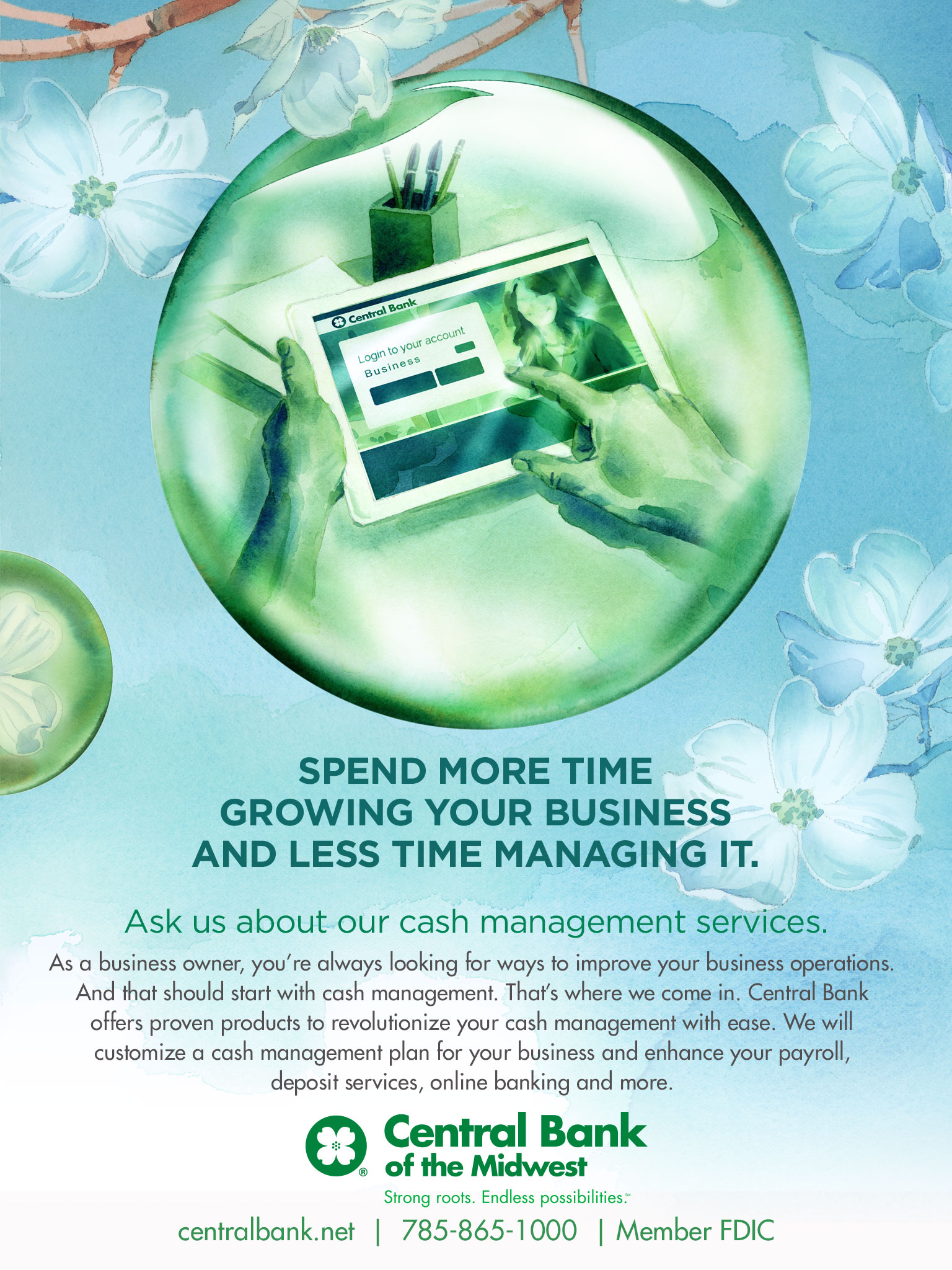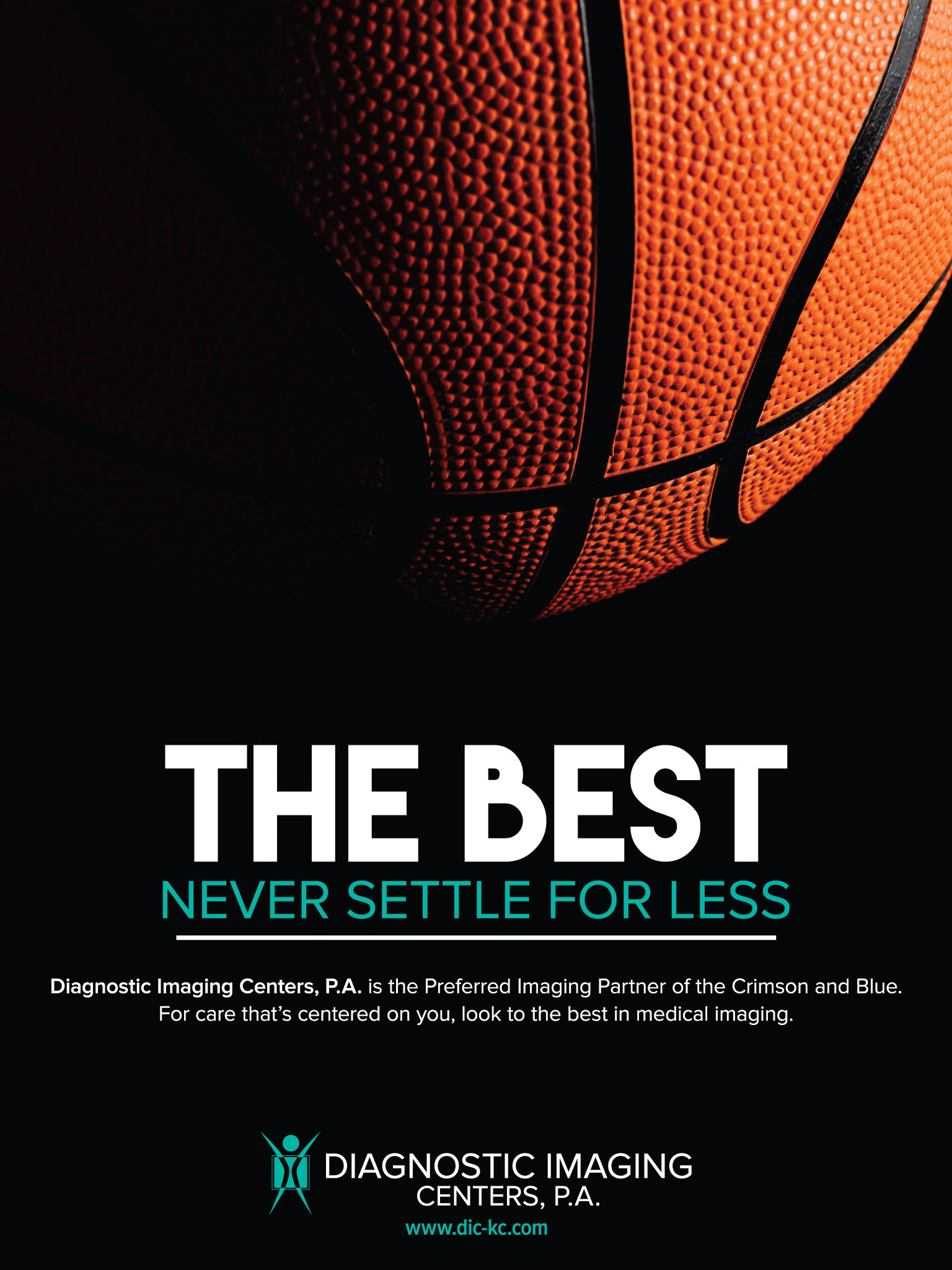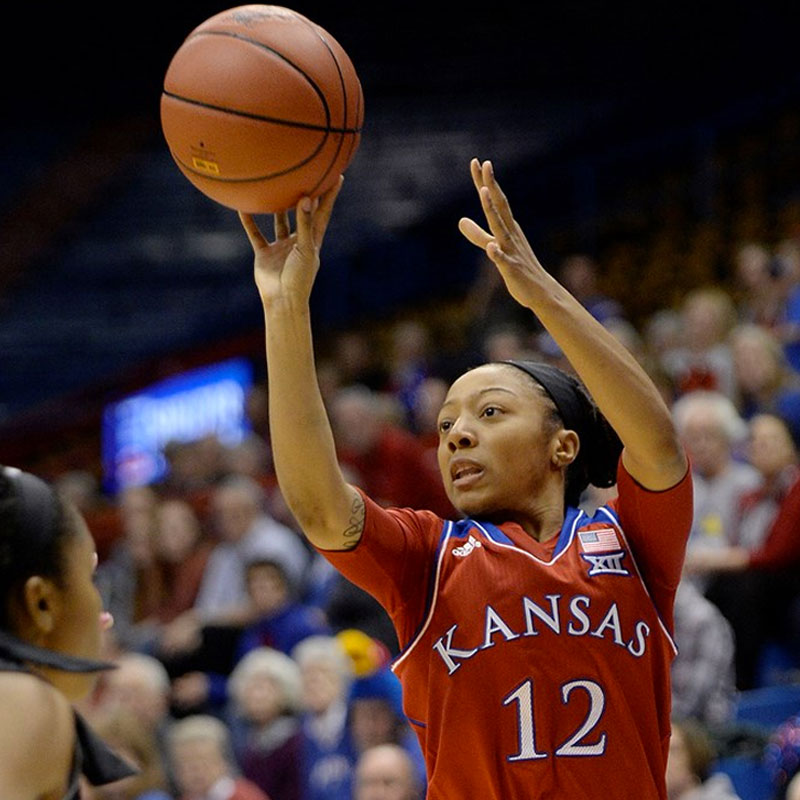RCW: #OneTeam - Timeka O'Neal
Whether it’s dribbling through a double team or putting up a contested jumper, there’s not much on the court that compares with the adversity that Kansas 3-point specialist Timeka O’Neal has overcome. KU’s second-leading 3-point shooter, the senior guard has bounced back from a knee injury and the loss of her father just before the start of her Kansas career to contribute for the women’s basketball team.
Q: When did your love for the game of basketball start?
A: I started playing basketball when I was in fifth grade. I started late. I just remember going outside, we had a basketball in the house, and I was just dribbling the basketball out on the sidewalk and I noticed I was getting better at it. I started to go between my legs and my dad started noticing how good I was at it. He started saying, ‘My daughter is an athlete. She can dribble the ball a little bit.’ He started to suggest that I put a little more time into it and it started becoming something I was really interested in. My dad put me into the Raytown girls’ basketball league and I started playing against other little girls in the area. I did that for about three years and had a lot of success. After that, (basketball) became something that I really, really enjoyed because I had a lot of success with it. People in the crowd started noticing I was fast and I was actually tall, at the time. (In middle school), I started really getting into bigger competition, but I wasn’t as experienced because I had started so late. I didn’t do great my first year, but I came back for my second year and I started. My dad and I put a lot of time and effort into my game and there were times where my dad would wake me up and I would say, “Dad, I don’t feel like it. It is too early.” He motivated me and had a lot to do with my success today. It was amazing though because people would come up and say, “You did a 360. You were not as good last year.” It felt good, but it took a lot of blood, sweat and tears. I really fell in love with basketball when people started noticing my game.

Q: So did you have a hoop at your house to shoot, or was it just dribbling?
A: I was just dribbling the ball. I didn’t have a basketball goal. We lived in apartments and there wasn’t like a community court out there.
Q: How were you exposed to basketball before that to know how to handle the ball and dribble between your legs?
A: My dad played (NBA) 2K a lot with his friends and we would see (games) on TV. I would watch North Carolina, Tennessee and LSU when they had Seimone Augustus. North Carolina was with Ivory Latta and other good players, and I looked up to Ivory Latta when I was starting to get involved in the game. I really got into watching the NCAA Women’s Basketball Tournament and really dug deep into it. That is really when I started to love this game.
 Q: How did your game evolve considering when you started you were “tall,” despite your 5-foot-4 stature now?
Q: How did your game evolve considering when you started you were “tall,” despite your 5-foot-4 stature now?
A: I was a post (with a big smile). Eventually, I stopped growing and other girls started to pass me up and then I had to learn the point guard position. I have to say, the first time I played it I hated it. I actually cried because I turned the ball over so much since I wasn’t used to it. But, again, after the game I talked to my dad and we agreed we were going to work at it and fix some things. It was just a way to broaden my game and make it more fun. I got to play both posts at one point in my life and the guard spots.
Q: When you were playing post, you were back to the basket and everything?
A: (Laughing). Yes, back to the basket. Mostly drop step and go up, at that point it wasn’t that disciplined.
Q: What were the workouts like with your dad?
A: My dad, before I even went out and picked up the ball, my dad was a football coach. So he worked with kids around the Kansas City metro area who didn’t have families or that much support. After he realized he had an athlete of his own, he decided to invest his time in his daughter. In the beginning, it was just me and my dad (for the training). He would try to do everything he could. He would pay people to work me out if he wasn’t in town. He would cut stumps off of trees and they would be like two and half feet high and I would jump on that to work on my vertical. I would jump rope. I had the dribble goggles where I couldn’t see. We would be in the garage when we moved into our house and he would turn off the lights even though I had the goggles on and I couldn’t see anyway. I would just stay in there and dribble for like 10 minutes straight, just working on ball handling. It was pretty intense for a young girl, but I got through it and it paid off.

Q: Being a football coach, how did your dad know what drills and techniques to do to help you with the game of basketball?
A: I have a whole bunch of DVDs that my dad bought. Then once I started playing on teams, those parents would lend my dad videos that helped their daughters. He would want to watch them with me, but I would be stubborn and say, “But dad, I want to go outside and play.” Once I sat down and watched it with him I knew it was quality time with my dad and I knew it was something he enjoyed. After a while, I began to enjoy it too and I wouldn’t even care about going outside anymore.
Q: Not only did those workouts with your dad help your game, but have you noticed the effect on your work ethic?
A: Definitely. Every time I go to practice I think about my dad. My dad and I had this thing we did before every game that we used to do. It was kind of like a pump-up sesh (session). Before I would go out and warm up with the team, my dad and I would dap fists with each other. And then he would go, ‘Are you ready? Are you ready? Are you ready? Are you ready to get down?’ And I would say, ‘yeah, I’m ready to get down.’ Then he would ask, ‘Are you ready to get down, Timeka?’ I would answer, ‘Yes, I’m ready to get down Daddy.’ Then he would close with, ‘Well, go out there and play your game. We can beat these girls. You’re going to play good.’ We did a lot of that and it pumped me up for the game.
Q: You mentioned you were an only child, so you had a lot of attention?
A: (Laughing) Yes, I did. I’m actually the only child and the only granddaughter, so I definitely got a lot of attention. There was a lot of time and effort put into me. All the money and the travel. It was definitely fun. I got everything I wanted.
Q: Do you have regrets at all that you never had a sibling?
A: People ask that a lot. At first, I did. But, I had a lot of cousins. We have a big family. That just kind of substituted for not having a brother or sister. I had a lot of cousins spending the night, as we always had sleepovers.
Q: Going back to basketball, your high school career came to an end and what were your plans to continue your education and playing career?
A: I was definitely hoping to (play) Division I (basketball) right from high school, but I had some setbacks. That was my dream. That was my goal. I had a really good high school career, especially my senior year. My (recruiting) letters were hidden from me. My coach hid them from me. That set back a lot of opportunities for me because colleges would send questionnaires and if I don’t get those, I can’t reply and let them know that I am interested. So colleges thought I wasn’t interested, but that was not the case. That was a real frustrating point in my life, because I felt like I was stuck because a lot of my teammates had committed to colleges and I was sitting back thinking, ‘What am I going to do?’ I did have options like going far away, as Pepperdine was still interested in me, but I wasn’t ready to leave home. (During that time), Johnson County Community College gave me a call and they had been coming to all of my games. I had never heard of it and I wasn’t looking at it as a positive. At the end of the day, (going to JCCC) was probably the best decision I ever made. I learned a lot more than I thought I knew.

Q: What did you learn about yourself at Johnson County CC?
A: Life, basketball, all of that. I had a really, really good relationship with my coach, something I did not have in high school. I also learned that I wasn’t just playing for my teammates, I was also playing for my coach. That made it a lot more fun. I was playing point guard and I learned a lot more. I learned to facilitate the court, to look up the court. My vision was good. I just felt comfortable and relaxed. Also getting my grades (up) and being more aware of what I needed to get done. Plus, I was close to home so my family could come watch me play.
Q: While at JCCC, Kansas starts recruiting you. What was that process like and how did you end up at KU?
A: (Former assistant coach) Mahogany Green came to one of my games when I was playing at Johnson County. It was one of our final games and I still wasn’t sure where I was going to go. I guess I really had a good game that day, because you don’t really know who in the crowd is watching – that’s the beauty of it. I had just had a conversation with my mom and grandparents and they were saying. ‘This is almost it and we have really enjoyed watching you play.’ They still wanted to watch me play and were dropping hints that they didn’t want me to go far and then one of them said, ‘Wouldn’t it be awesome if you went to Kansas?’ I said, ‘Yeah, that would be nice.’ Two days later, I got a call from my coach at Johnson County and he said, ‘Okay, Meek, don’t freak out, but you got a call from Kansas.’ I said, ‘Are you serious?’ I hung up the phone and went and told my papa and then I started tearing up because things were finally working out and falling into place. It was always a dream to play (in the) Big 12.
 Q: Walk us through your signing day, what was that day like?
Q: Walk us through your signing day, what was that day like?
A: Signing day was very special. It was sad too, because I was leaving a coach (Ben Conrad) I really cared about. My dad was there right by my side as I was signing. All the girls on the team who were signing were all lined up. I just remember when I had the paper in front of me and the pen in my hand, I looked at my dad and he just smiled. I knew he was happy and satisfied. I looked at my mom and everyone else and I started to tear up and then I signed.
Q: Things were really happening for you, but then a couple of months before you start your career at Kansas, your life changed on May 27. What happened?
A: (When I was) growing up my dad lived right across the street from my grandparents. My dad worked early in the morning and most days when he had to work, I would sleep at my grandparents’ house. (This particular night) I spent the night with my dad and I don’t regret that I did. I was in my room (in the middle of the night) and it started getting really, really hot in there – it was like an angel. I had the window open and everything, but it wasn’t hot outside, it was cold outside. I had the fan on, but it was really hot. I felt uncomfortable so I left my room and I felt like God telling me to get up and go stay with my dad. So, I went and stayed with him and slept with him that night. That next morning, all I heard was my dad talking on the phone about how he was going to go to work earlier. It was weird because I woke up, went downstairs and saw him, then I just kept following him throughout the house. He would go in the kitchen. I would go in the kitchen. He would go in the living room. I would go in the living room. Eventually he went back upstairs and I stayed downstairs and was about to fall back asleep. Then my dad started calling my name, ‘Timeka! Timeka! Timeka!’ I started getting up, but I was tired and moving slow. I wasn’t thinking anything (could be wrong). I start walking up the stairs, taking my time, and I see him lying on the floor. He had been working out before he went to work and had a heart attack. He said, “Meek it’s going to be okay, just call 911.’ I was getting nervous and I called 911. Then I called my grandpa across the street and he came over. My dad just kept saying he couldn’t breathe. Nothing was hurting, he said he just couldn’t breathe. Then he said something I will never forget, my dad said, ‘Lord, forgive me for my sins’ and he just kept repeating that. From that point on, I knew he wasn’t going to make because it just felt so surreal. After the ambulance came and got him, we got called by the doctor at the hospital and everyone was there: my grandparents, my mom, our pastor, and they said that they couldn’t get his heart working again. I lost a big chunk of my life and just threw everything (in that room). You would have thought a tornado had hit it. I was in disbelief that it had happened and to see my grandmother; my dad was her only child, and my mom; they were divorced but talking about getting back together, in that much pain. It just sucked.
Q: You had just lost your father, but you still had to get some things done at Johnson County before you come to KU. How did you stay focused?
A: I wasn’t even thinking about classes at that point. My grandpa, especially, is big on education and is always saying, ‘Meek, you have to get your degree and you can do anything you want to do in life.’ A lot of people were afraid I wasn’t going to be able to get it done. But, I became really strong for my dad, I became really strong for my family, my mom and my grandparents. I knew my dad wanted me to go to Kansas and kept picturing his face smiling at me at my signing day. I didn’t want to disappoint him and I felt like I was obligated to get it done and finish it out. And I did, I finished with a 3.5 (grade-point average).

Q: You arrive at Kansas, but suffer a season-ending knee injury at the start of the season and then at the end of the year the team got a new head coach. How did you handle that year with the loss of your dad, your first major injury and a coaching change?
A: I didn’t even get hurt in a game, it was at a practice. As far as physically hurting, that was the worse feeling ever. I went into deep, deep depression after that. I had so many bad things happening at that time and I was like, ‘God, what else can you throw at me? I can’t take anymore at this point.’ I started to get really down on myself and I wasn’t talking to anybody. I was holding it all in because the only person I ever really talked to was my dad. I would talk to my mom, occasionally, but it wouldn’t be on that level. I would stay in my room and I had thoughts of suicide. I wanted to do all that because I felt like everything bad was happening and it wasn’t what I had planned. But it didn’t stay that way. After a while, Ann (Wallace) our (athletic) trainer was helping me with my rehab. I had to look deep inside myself and see what I could do to make this year better, even though I wasn’t playing. I still had a purpose for the team and I could still be positive and a good teammate. I started writing a lot. Writing all my thoughts out and writing prayers to keep a positive vibe around me. I was tired of being so negative. I can’t even tell you how supportive Ann was through that process, because she knew … she knew that I had lost my dad and she knew what I was going through. During my rehab, Ann had her baby and Addie, she was like a rehab baby for me. She was like a little weight and she kept me happy. It wasn’t a boring rehab … it was uplifting.
Q: What is your relationship with Ann and Addie now?
A: Addie is a big girl now. She doesn’t really talk to me that much (laughing). But that is still my girl though. I’m really close with Ann still. Ann is a really, really good person.
Q: How cool is that for Addie, that she helped change a life before she could even talk?
A: Exactly. Exactly. Having a baby around you is like, ‘Ohhhh.’ It warms your heart. She definitely had an impact on my life.
Q: What was it like to finally get to put on that Kansas uniform, thinking about all the work it took to get there?
A: I cried. I cried when I got the chance to put it on in the locker room. It felt really, really good. I didn’t physically say it, but I said it in my head, ‘We made it, Dad. We are here, Dad, we made it.’ I know he was there.


